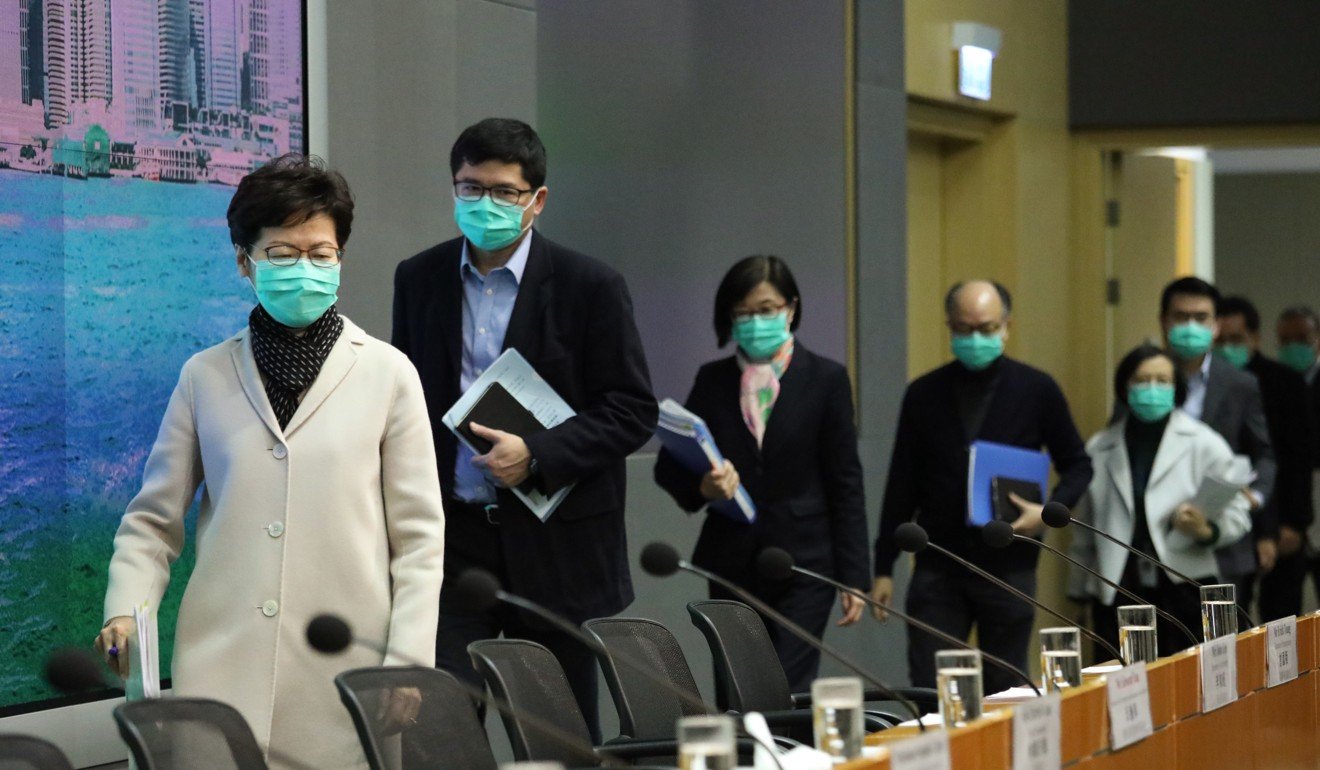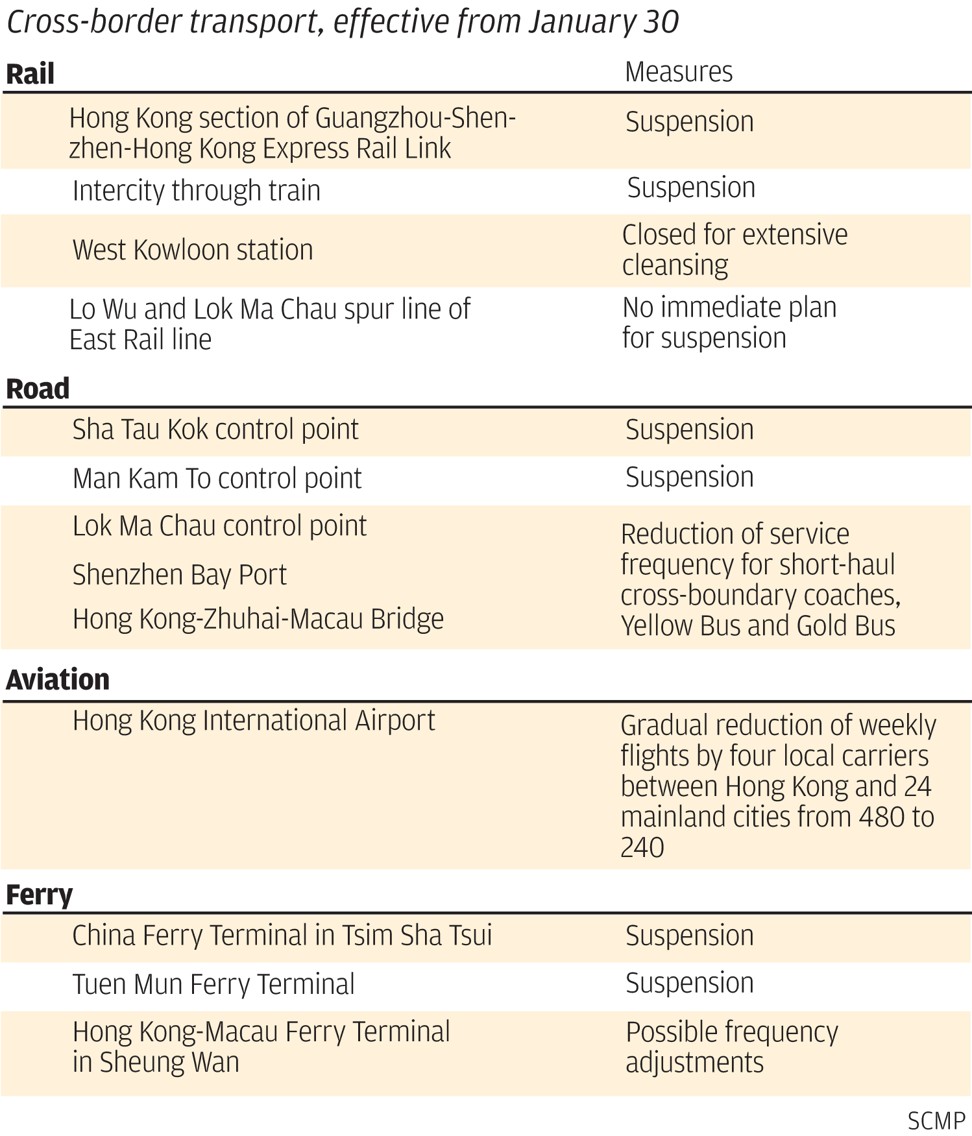
China coronavirus: Hong Kong scrambles to roll out containment plan stopping short of total closure, with cuts on cross-border travel and reduced transport services with mainland
- City leader Carrie Lam declares seven measures, with government employees to work from home, while news of vaccine progress brings hope
- HKMAO issues statement noting that steps announced were result of central government’s proactive involvement and timely communication

Hong Kong will drastically reduce cross-border travel with the rest of China as it adopts tougher measures to contain the spread of the deadly Wuhan coronavirus, starting with the shutdown of the two railways and suspension of new visas to individual mainland tourists.
Flights to and from the mainland would be cut by half and cross-border bus services would also be reduced, Chief Executive Carrie Lam Cheng Yuet-ngor announced on Tuesday as she spelled out a new containment strategy that stopped short of a total closure of the city’s borders demanded by legislators from across the political spectrum.
Officials announced that Beijing had agreed to stop issuing permits for mainlanders travelling individually to the city rather than just for tour groups, accounting for half of all cross-border visitors to the city. The restrictions would be effective from midnight on Thursday.
The government also asked all its employees, except for those providing essential and emergency services, to start working from home – while more private companies offered the same option to their staff.

But even as the death toll climbed above 100 and more than 1,770 new cases were reported across the mainland on Tuesday, infectious disease experts in Hong Kong raised a glimmer of hope, revealing they were on their way to developing a vaccine to fight the virus that has already hit more than 4,000 people globally.
In her second press conference on measures to cope with the epidemic that began in Hubei’s provincial capital, Lam, wearing a mask herself, said through-train services between Hung Hom and Guangzhou would be suspended, along with high-speed train services to the mainland. The Man Kam To and Sha Tau Kok border checkpoints would also be closed.

“It is very regrettable that many rumours have been spread on the internet. This misinformation will eventually hurt society,” Lam said. “One of the examples is that I would use Hong Kong’s resources to help China to fight the virus. This is ridiculous … I strongly condemn people who spread such rumours.”
The State Council’s Hong Kong and Macau Affairs Office in Beijing issued a statement promising full support in the battle against the virus, but also noting that the measures announced by Lam were the result of the central government’s proactive involvement and timely communication between the two sides.
“We resolutely oppose the politicisation of epidemic issues, which are related to the safety of life. We also hope that Hong Kong and Macau people will not broadcast, believe or spread rumours,” the office said.
We also hope that Hong Kong and Macau people will not broadcast, believe or spread rumours
In addition to closing half of the city’s border checkpoints and suspending individual travel visas, cross-border transport services will also be reduced, while enhanced health declaration requirements will be imposed on incoming travellers.
The six checkpoints to be closed from Thursday are Hung Hom, West Kowloon, Sha Tau Kok, Man Kam To, the China Ferry Terminal and the Tuen Mun Ferry Terminal. Together, they handled only 8.9 per cent of cross-border travellers from last Friday to Monday, and accounted for 7.6 per cent of passenger flow in 2018.
In contrast, the three largest border crossings that will remain open – Lo Wu, Lok Ma Chau and the international airport – handled 85 million, 56 million, and 53 million travellers respectively in 2018.
But Lam remained adamant that a total closure of all border crossings was unwarranted.
Hongkongers themselves accounted for 67 per cent of all cross-border border travel from January 1 to 26, while mainlanders made up only 26 per cent, she explained.
“The situation is evolving and changing very rapidly … We will continue to closely monitor the situation both locally, on the mainland, and internationally, and take the necessary and decisive actions to protect people’s health,” she said.
Facing a public backlash over plans to offer free treatment in the city to mainlanders along with anyone else needing hospitalisation due to coronavirus infection, Lam said the arrangement would be changed and public hospitals would charge all non-residents full medical costs.
More surgical masks would be made available, she added, responding to complaints about a shortage.
Commerce minister Edward Yau Tang-wah said the priority was to ensure adequate supplies for medical professionals. “This will form the bulk of the demand, so we will go for direct purchases and also tendering out on a global basis,” he said.
Leading microbiologist Dr Ho Pak-leung from the University of Hong Kong said the partial border closure was expected, as a total shutdown would involve many administrative measures that might not be handled quickly.
“The latest measures could help a bit, but some important matters should be done quicker,” he said, urging the government to ascertain the number of people from Wuhan in Hong Kong as soon as possible.
“I’m surprised to see the government is still not able to tell how many Wuhan citizens are in Hong Kong,” Ho said.
I’m surprised to see the government is still not able to tell how many Wuhan citizens are in Hong Kong
Opposition politicians remained unimpressed, criticising Lam for stopping short of a total border shutdown and warning that mainlanders carrying the virus could still enter Hong Kong if they were already holding valid visas.
“The government is leaving a loophole by still allowing mainland visitors to see their families here, as well as business visitors. Why can’t we require all to apply and only vet on a case-by-case basis?” Civic Party leader Alvin Yeung Ngok-kiu said.
Pro-establishment legislator Michael Tien Puk-sun, also a deputy to China’s parliament, questioned why the government was not getting tougher, especially on visitors from neighbouring Shenzhen who were already carrying individual travel permits.
“People from different provinces all gather in Shenzhen, and they are possibly spreading the virus from Shenzhen,” he said.